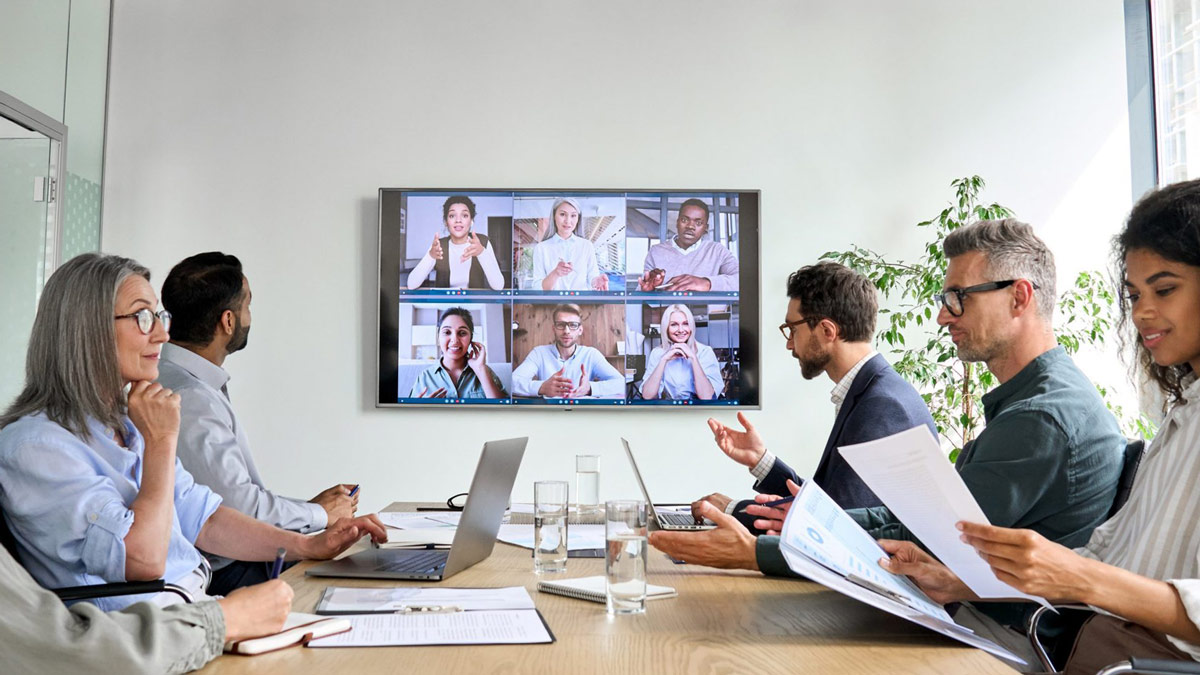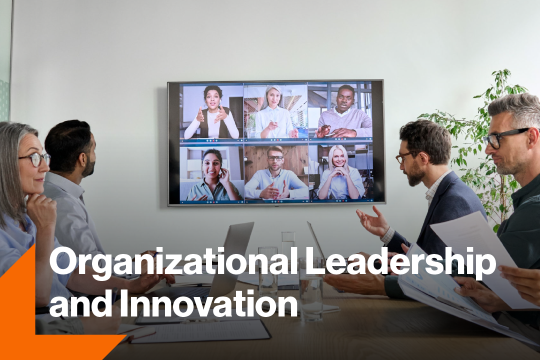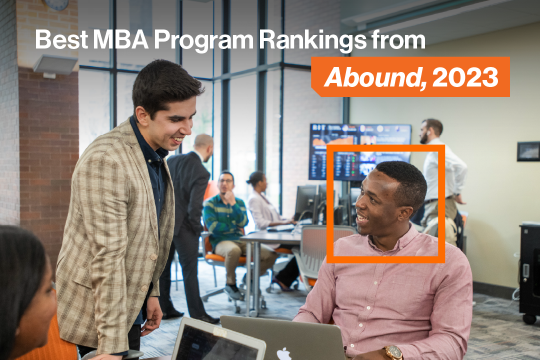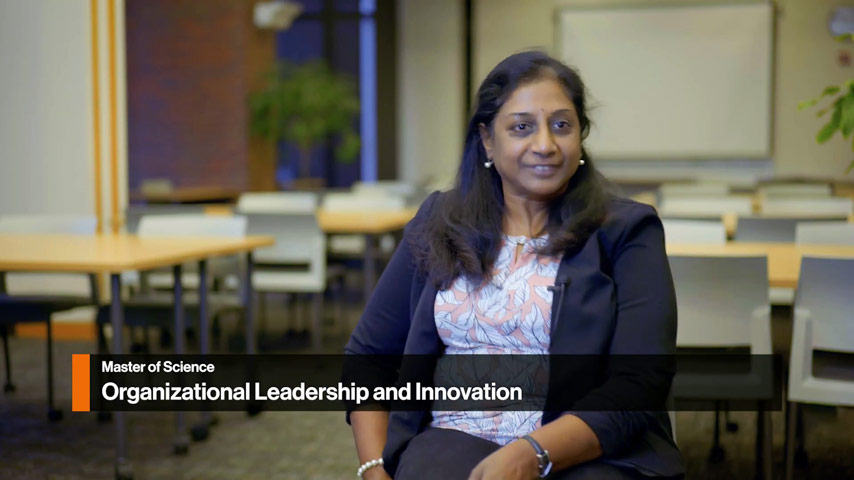Organizational Leadership and Innovation Master of Science Degree

Organizational Leadership and Innovation: Online
Master of Science Degree
- RIT /
- Rochester Institute of Technology /
- Academics /
- Organizational Leadership and Innovation MS
In the MS in organizational leadership you will create intentional, collaborative work environments to analyze, identify, and influence an organization’s ability to innovate and evolve.
Overview for Organizational Leadership and Innovation MS
Why Study RIT’s MS in Organizational Leadership
Lead the adoption of innovation in today's tech-infused business environment.
Gain global experience at one of RIT’s global campuses:, RIT Croatia, RIT Dubai or RIT Kosovo.
Participate in active, case-based learning, working with the latest technology and software in state-of-the-art facilities.
Ideal for working professionals wanting to build and lead innovative teams and projects.
The master’s in organizational leadership is designed to develop leaders who have the mindset and advanced skills to lead in organizations that are constantly adopting and evolving with the latest in tech innovations. The organizational leadership and innovation program empowers you with the knowledge, skills, and mindset to lead organizations of the future. You will be equipped with the tools to spearhead innovative projects and enable your organization to embrace the changes that come with innovation. Courses focus on technological changes and their implications for leadership, developing the ability to foresee emerging trends and technologies, creating strategies to exploit the foresight, leading teams of innovators, creating a work environment that encourages experimentation, and enabling individuals to change, adapt, and evolve.
By combining two critical aspects that determine success of organizations in the future – innovation and leadership – this unique program prepares you to:
- Foresee emerging technologies and innovations
- Develop strategies to capitalize on foresight
- Create innovative work cultures
- Guide creative individuals
- Lead change initiatives
Is the MS in organizational leadership and innovation management right for you?
Are you a working professional interested in influencing people, leading a team of innovative individuals, implementing innovation, or leading change initiatives in your organization? Then the organizational leadership and innovation program might be for you. The program attracts professionals who are:
- Skilled with a technical background and are (1) interested in leading innovative projects or (2) developing the knowledge and skills to lead a team of innovators.
- Mid- or entry-level and keen to grow into leadership roles.
- Leaders in traditional organizations who aspire to lead an organization towards innovation.
- Mid-career professionals tasked with leading change initiatives.
- Passionate entrepreneurs keen to build an innovative organization.
- Managers dealing with changes in technology and the workforce.
- HR professionals interested in developing innovation talent within an organization.
What is Organizational Leadership?
Leading in innovative environments demands leaders who have a future-focused mindset. They possess the advanced skills to develop teams for organizations that are strategically adopting and evolving from the latest in technology innovations. Organizational leadership is creating an intentional, collaborative work environment where you are able to identify and influence organizational change, to innovate and evolve. Leaders of innovation are initiators, doers, range-agents, and change-makers.
RIT’s Master’s in Organizational Leadership and Innovation
Constant technology advances provide organizations with a growing set of tools and opportunities to manage innovative work cultures. They need leaders to spearhead organizational change, with strategic foresight and innovation, to leverage technology and the future of work. In the MS degree in organizational leadership and innovation, you will be equipped with the tools to spearhead organizational change and foresee emerging technologies in innovative contexts. The curriculum adds future-focused and innovative leadership-oriented courses that leverage faculty expertise in organizational leadership, innovation, technology, and strategy development. You’ll learn to create an entrepreneurial culture and build sustainable teams while you develop skills in the leadership and management of innovation.
Careers and Experiential Learning
Typical Job Titles
| Change Management Specialist | Chief Innovation Officer | Chief Innovation Strategist |
| Director of Innovation and Learning | Director of Leadership Development | Director of Strategy and Innovation |
| Director of Talent Innovation | Innovation Expert | Innovation Director |
| Innovation Lead | Innovation Manager/Project Manager | Innovation Strategist for the Workforce |
| Organizational Development and Change Management Specialist | Program Manager, Innovation | Senior Manager, Organizational Effectiveness and Change |
Cooperative Education and Internships
What makes an RIT education exceptional? It’s the ability to complete relevant, hands-on career experience. At the graduate level, and paired with an advanced degree, cooperative education and internships give you the unparalleled credentials that truly set you apart. Learn more about graduate co-op and how it provides you with the career experience employers look for in their next top hires.
Co-ops and internships take your knowledge and turn it into know-how. Business co-ops provide hands-on experience that enables you to apply your knowledge of business, management, finance, accounting, and related fields in professional settings. You'll make valuable connections between course work and real-world applications as you build a network of professional contacts.
Cooperative education is optional but strongly encouraged for graduate students in the MS in organizational leadership and innovation.
Organizational Leadership and Innovation Careers
Graduates of RIT's MS in organizational leadership and innovation are prepared for outstanding career opportunities leading organizations to successfully implement innovation. The job market shows a consistent increase in demand for students who know how to lead in innovation contexts. Our Management Advisory Board helps students prepare for their careers by ensuring the curriculum is continuously updated to meet employers needs while providing networking and mentorship opportunities.
Featured Work and Profiles
-
Research Insights: A strategy paradox in Swiss timekeeping
Rich DeJordy How leaders with opposing visions find a new path forward
Read More about Research Insights: A strategy paradox in Swiss timekeeping -
Empowering Future Leaders Through Mentorship and Innovation at Saunders
Michelle J. Teal ’23 "It was a game-changer for me as it gave me the skills and knowledge to transition into a new role as a project manager prior to graduating. The program provided valuable practical skills that allowed...
Read More about Empowering Future Leaders Through Mentorship and Innovation at Saunders -
Research Insights: Coming full circle
Clyde Eirikur Hull Exploring circular economy opportunities.
Read More about Research Insights: Coming full circle
Curriculum for 2025-2026 for Organizational Leadership and Innovation MS
Current Students: See Curriculum Requirements
Note for online students
The frequency of required and elective course offerings in the online program will vary, semester by semester, and will not always match the information presented here. Online students are advised to seek guidance from the listed program contact when developing their individual program course schedule.
Students are also interested in
Admissions and Financial Aid
This program is available exclusively online.
| Offered | Admit Term(s) | Application Deadline | STEM Designated |
|---|---|---|---|
| Part‑time | Fall. Closed for Fall 2026. | Rolling | No |
Part-time study is 1‑8 semester credit hours. RIT will not issue a student visa for programs offered exclusively online.
Application Details
To be considered for admission to the Organizational Leadership and Innovation MS program, candidates must fulfill the following requirements:
- Complete an online graduate application.
- Submit copies of official transcript(s) (in English) of all previously completed undergraduate and graduate course work, including any transfer credit earned.
- Hold a baccalaureate degree (or US equivalent) from an accredited university or college. A minimum cumulative GPA of 3.0 (or equivalent) is recommended.
- Submit a current resume or curriculum vitae.
- Submit a personal statement of educational objectives.
- Letters of recommendation are optional.
- Entrance exam requirements: GRE or GMAT required for individuals with degrees from international universities
- Submit English language test scores (TOEFL, IELTS, PTE Academic, etc.), if required. Details are below.
English Language Test Scores
International applicants whose native language is not English must submit one of the following official English language test scores. Some international applicants may be considered for an English test requirement waiver.
Duolingo (DET): 130
IELTS: 6.5
LanguageCert Academic: 74
PTE Academic: 60
TOEFL: 88/4.5
International students below the minimum requirement may be considered for conditional admission. Deaf and hard-of-hearing test takers with significant hearing loss do not need to take the listening and speaking sections for the TOEFL and IELTS. Each program requires balanced sub-scores when determining an applicant’s need for additional English language courses.
How to Apply Start or Manage Your Application
Cost and Financial Aid
An RIT graduate degree is an investment with lifelong returns. Graduate tuition varies by degree, the number of credits taken per semester, and delivery method. View the general cost of attendance or estimate the cost of your graduate degree.
A combination of sources can help fund your graduate degree. Learn how to fund your degree
Additional Information
Online Degree Information
The courses in the online Organizational Leadership and Innovation MS are a combination of asynchronous and synchronous. Delivery format will vary based on the preference of the faculty leading the course. Synchronous courses meet one day a week for a 2 1/2 hour session in the evening (ET). Academic advisors work with students on a study plan after admission to ensure classes fit student availability. The exit strategy for this program is a comprehensive exam (no capstone project or thesis option). Typically students finish this degree in 24-36 months. For specific details about the delivery format and learning experience, contact the Program Contact listed on this page. RIT does not offer student visas for online study.
Online Tuition Eligibility
The online Organizational Leadership and Innovation MS is a designated online degree program that is billed at a 43% discount from our on-campus rate. View the current online tuition rate.
Online Study Restrictions for Some International Students
Certain countries are subject to comprehensive embargoes under US Export Controls, which prohibit virtually ALL exports, imports, and other transactions without a license or other US Government authorization. Learners from the Crimea region of the Ukraine, Cuba, Iran, North Korea, and Syria may not register for RIT online courses. Nor may individuals on the United States Treasury Department’s list of Specially Designated Nationals or the United States Commerce Department’s table of Deny Orders. By registering for RIT online courses, you represent and warrant that you are not located in, under the control of, or a national or resident of any such country or on any such list.
Accreditation
Related News
-
August 7, 2024

Flexible and Online, Organizational Leadership and Innovation Helps Professionals Create Intentional, Collaborative Work Environments
Our flexible and online master’s of science in organizational leadership and innovation (OLI) provides students with the tools to spearhead organizational change in fast-paced, technology-driven contexts and to create a culture of entrepreneurship.
-
February 23, 2024

Succeeding in Organizational Leadership and Change Management
MASTERGRADSCHOOLS.com speaks with Malarvizhi Hirudayaraj, program director of the online Master’s in Organizational Leadership and Innovation at RIT Saunders College of Business. She shares their unique approach to preparing future leaders, in an era of rapid change and technological disruption.
-
August 17, 2023

Saunders Ranked Among Abound Best MBA Programs 2023
Saunders College has been recognized as among the Best MBA Programs of 2023 by Abound.
Contact
- Delaney Ball
- Assistant Director
- Office of Graduate Admissions
- Enrollment Management
- 585‑475‑6933
- Delaney.Ball@rit.edu
- Matthew Cornwell
- Associate Director of Student Services
- Student Services
- Saunders College of Business
- 585‑475‑6916
- mcornwell@saunders.rit.edu
Saunders College of Business


















